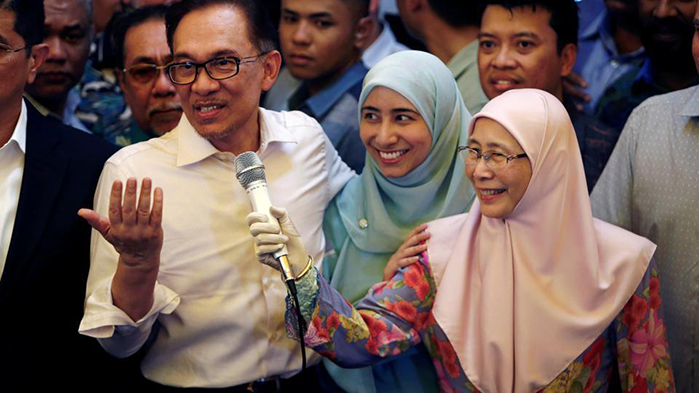Mahathir is Back!
Anwar Ibrahim pardoned and freed from prison
Developing Just LeadershipWaseem Shehzad
Ramadan 16, 1439 2018-06-01
News & Analysis
by Waseem Shehzad (News & Analysis, Crescent International Vol. 47, No. 4, Ramadan, 1439)
Events are moving rapidly in Malaysia since the May 9 general elections that ousted the long-ruling Barisan Nasional (BN) coalition, whose principal component is the United Malay National Organization (UMNO), from power. It not only ended the scandal and corruption-ridden rule of Najib Razak but also broke the uninterrupted spell in power of BN. The coalition had ruled the country since independence from British colonialism in 1957.
Mahathir Mohamad, the former prime minister who came out of retirement at age 92, was sworn in as prime minister almost immediately. He appointed Wan Azizah, wife of opposition leader Anwar Ibrahim (who was in jail at the time but has since been released through a royal pardon) as deputy prime minister. Other posts went to Lim Guan Eng of the Chinese dominated Democratic Action Party (DAP) as Finance Minister, Muhyiddin Yassin as Home Minister, and Mohamad Sabu, leader of Amanah Party as Defence Minister. Sabu’s party broke away from the Islamic Party of Malaysia (PAS) that not only retained its stronghold of Kelantan but also won the Terengganu state.
Among Mahathir’s other announcements was the establishment of the Council of Elders that would act as an advisory body to government. At 92, Mahathir does not expect to hold the reigns of power for too long. The council may enable him to continue to be involved in decision-making.
A few days after the election when Najib said he and his wife would take a holiday abroad, the government stopped them from leaving, pending results of investigation into corruption allegations. Najib resigned from the leadership of Barisan Nasional as well as head of UMNO.
On May 19, the police raided their home in an upscale neighborhood of Petaling Jaya taking away tons of material for investigation. Najib complained about the “indiscriminate” police raid that even took away hundreds of expensive handbags belonging to his wife Rosmah Mansor. According to reports, the bags were stuffed with expensive jewellery and cash! One is reminded of the hundreds of shoes belonging to Imelda Marcos, wife of the Philippines dictator Ferdinand Marcos!. From the prime minister’s house to the doghouse, it seems is a short distance!
At the root lies a multi-billion-dollar graft scandal at 1Malaysia Development Berhad (1MDB). The state investment arm that Najib created and oversaw is currently at the center of ongoing international embezzlement probes.
Najib is also accused of embezzlement of some $700 million that the Saudi regime gave him. This money is unaccounted for and is believed to be payment to Najib to declare Shi‘is as kafirs (nastaghfir-allah) and for the Malaysian navy’s deployment in enforcing the siege of Yemen that the Saudis attacked in March 2015. To his lasting shame, Najib took the bribe and indulged in this destructive policy.

While investigation into Najib’s corruption scandals will take time, let us consider how the main opposition alliance Pakatan Harapan (Alliance of Hope) was able to garner the much-needed support to knock Najib off his pedestal. With its star candidate, Anwar Ibrahim — the former deputy prime minister and one-time heir apparent to Mahathir languishing in jail — Harapan was looking for a crowd puller. They agreed to be led by former Prime Minister Mahathir, who had come out of retirement two years ago, “embarrassed” at the corruption of his former protégé Najib.
Obviously, Mahathir’s old party, the United Malay National Organization (UMNO), the largest component of BN, would not offer him the platform where Najib was ensconced and believed to be firmly in control. So he turned to the opposition alliance. Najib dubbed it as an “alliance of convenience” — and it may well be — but it was enough to knock him from power.
Anwar Ibrahim’s party Kaedilan is the largest component of Harapan. He was a one-time ally and heir apparent to Mahathir until the two had a falling out in 1998. The opposition alliance was willing to accommodate Mahathir provided he promised to secure a royal pardon for the imprisoned Anwar in the event of victory.
The former prime minister said he would do one better. He would not only seek the king’s pardon for Anwar who was serving a nine-year jail term on “sodomy charge” but also hand over power to him in about two years. The deal was sealed and the campaign got into full swing leading to the stunning result of May 9.
Anwar Ibrahim has not only received a full pardon (he was released on May 16 from a hospital prison where he had undergone shoulder surgery) but he said he has buried the hatchet with Mahathir Mohamad. It needs recalling that it was Mahathir who had first accused Anwar of corruption and then sodomy charges because the latter was getting popular with the masses. Once Anwar was removed from the way, Mahathir handed power over to Najib. The latter also indulged in the same accusations against Anwar landing him back in prison despite the original conviction being overturned in 2004.
There is also a third party, the Parti Islam Se-Malaysia (PAS), the Islamic Party of Malaysia. It ran independent of BN and Harapan. Defying “expert” projections, it not only retained control of its stronghold in Kelantan, where it has ruled for nearly three decades, but it also took control of Terengganu from BN.
With Anwar a free man after a full pardon, he would be able to participate in politics. In order to become prime minister, he must first get elected to parliament. While this would not be an insurmountable challenge, the two-year wait may be too long. As Harold Wilson, the former British Prime Minister once famously said, “A week is a long time in politics.” We wish Anwar, Malaysia, and its people well.

